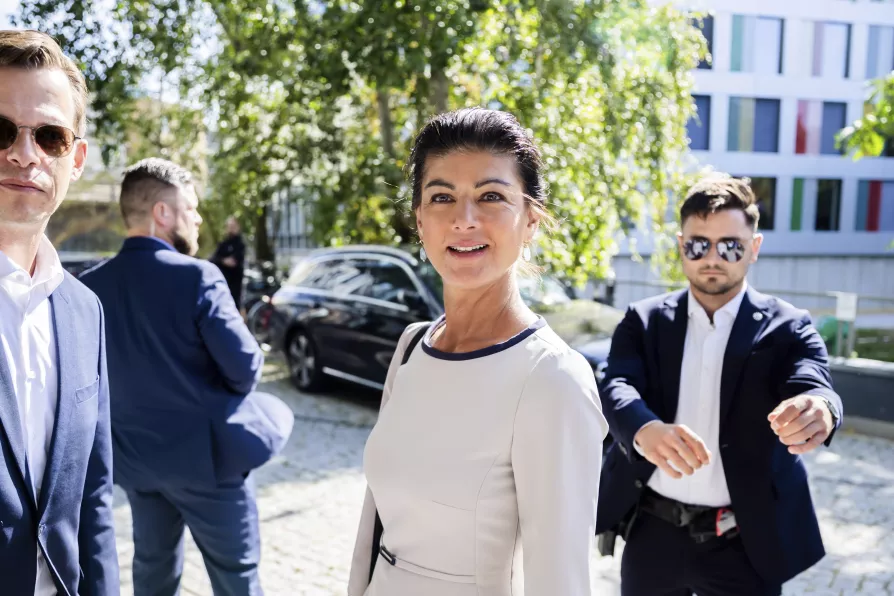As tens of thousands return to the streets for the first national Palestine march of 2026, this movement refuses to be sidelined or silenced, says PETER LEARY

 The charismatic leader of the Sahra Wagenknecht Alliance (BSW) has seen her breakaway migration-sceptical party already begin to eclipse the Left Party (Die Linke), which they split from in 2023
The charismatic leader of the Sahra Wagenknecht Alliance (BSW) has seen her breakaway migration-sceptical party already begin to eclipse the Left Party (Die Linke), which they split from in 2023
A DAY before last Sunday’s vote for a new parliament in the east German state of Brandenburg, opinion polls had the ruling Social Democratic Party (SPD) and the far-right AfD neck and neck.
The SPD finished up on 30.9 per cent, with the AfD on 29.2 per cent. The Christian Democrats slumped to 12.1 per cent, while the new Sahra Wagenknecht Alliance — Reason and Justice (BSW), on its first outing, won 13.5 per cent.
The gung-ho militarist Greens and Die Linke, from which BSW broke away over the latter’s abandonment of its anti-war position, failed to meet the 5 per cent barrier and are predicted to lose representation.
Brandenburg is the German region that lies adjacent to Berlin and is a bit more prosperous than Saxony and Thuringia — the two other former East German states where the governing parties in the so-called “traffic light” coalition of the SPD, Green Party and the extravagantly neoliberal Free Democrats collectively collapsed into a single figure, and where the AfD and BSW both grew at the expense of the government parties.
The AfD faces its usual problem that no-one wants to enter a coalition with it and the whiff of fascism that always taints its politics — even when it is in congruence with popular opinion in opposition to the Nato drive to the east and financing for the Ukraine war — is heightened by the toxic reputation of its Brandenburg leader Christoph Berndt, who plays word games with slogans from the Hitler era.
The BSW anticipated the Brandenburg election result with an undertaking that it would only enter a governing alliance with a party that favoured diplomatic action to end the Ukraine war.
The issue which exercised the political and media establishment in advance of the election was not so much the composition of a new Brandenburg regional government, where the national ruling coalition has little chance of constituting the local government and where even a mini version of Germany’s traditional “grand coalition” of the SPD and the CDU looks unlikely to garner enough mandates, but rather the likely knock-on effect in national politics and the fate of Chancellor Olaf Scholz.
The Chancellor is held in such low regard that Dietmar Woidke, the Brandenburg SPD premier, refused to campaign with him.
Having long ago abandoned firstly his anti-capitalist student roots and later his general orientation towards constructive dialogue with China and Russia — the latter upon which Germany relied for cheap energy for its manufacturing economy — Scholz is now seen as both unprincipled and a loser.
The balance of opinion within the SPD is shifting towards nominating Defence Minister Boris Pistorius — the federal-level politician most committed to Nato’s confrontation with Russia — as Chancellor of a new coalition.
Scholz himself opened the way for this shift with his newly adopted mantra that defence and security means confronting Russia on all fronts.
Anticipating Keir Starmer’s pledge for a year-on-year commitment to finance the Ukraine war, Scholz told the Munich “security” conference last February: “Without security, everything else is nothing.”
Last week, the European Parliament voted to end restrictions on the use of Nato-supplied weapons on Russian territory in a move that has only ambivalent support in the US and which is regarded sceptically by the more thoughtful in its security, intelligence and military elite who see the consequences of a third world war.
The coalition of warmongers that enabled this dangerous drift in the European Union’s military policy naturally included the usual suspects from the right and centre, but in today’s conditions, now routinely involves the parties of the so-called “socialists and democrats” group.

NICK WRIGHT returns to Berlin and finds a city in darkness and political turmoil













